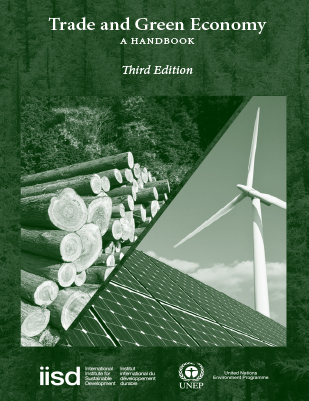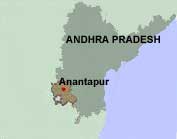Singur - 2
Going through the data and analysis by Buddhadeb Ghosh the information about 6% of the stated unwilling landowners holding 36% of the land points towards a clear class contradiction. What also contributed
Going through the data and analysis by Buddhadeb Ghosh the information about 6% of the stated unwilling landowners holding 36% of the land points towards a clear class contradiction. What also contributed
Admitting that MNREGA has its share of corruption and irregularities, Rural Development Minister Jairam Ramesh said on Sunday guidelines for the revamped version of the Centre’s flagship rural development

This handbook aims to foster a better understanding of the interlinkages between international trade, the environment and the green economy. It therefore focuses on national and international trade policy
New Delhi: The Supreme Court on Thursday tried to strike a balance between the apprehended side-effects of genetically modified seeds and foodgrains and the highincidence of hunger and poverty in India.
GOVINDSAMY AGORAMOORTHY In January this year I visited the Rajasthan part of the Chambal valley to study a water resources management project implemented by the
Modern agriculture practices have been great promise for economic development of nation. Farm productivity is directly proportional to use of agrochemicals as observed from the first green revolution.

The Micro Financial Sector (Development & Regulations) Bill 2007 has been under the scanner of late. The bill proposes to make the National Bank for Agriculture and Rural Development (nabard) the

Largest groundnut cultivation <br> 5,000 traditional water tanks <br> 104 farmer suicides during 2000 02
The Commission on Sustainable Agriculture and Climate Change has released its final report proposing policy responses to the challenges of feeding a world confronted with climate change, population growth,
Two debt-ridden farmers allegedly committed suicide by hanging themselves in two separate incidents in the district, police said on Tuesday.
The Planning Commission has warned that any cut in plan expenditure by the states will seriously affect the process of poverty eradication, and has suggested that increased agricultural productivity
This was only a one-time waiver and farmers would fall back into debt Left parties would oppose move to increase working hours from 8 to 10 THRISSUR: Communist Party of India (CPI) general secretary A.B. Bardhan said on Saturday that the loan waiver scheme announced by Finance Minister P. Chidambaram in his budget speech on Friday was no solution to farmers' indebtedness. "For four years, you saw the farmers dying. For four years, you watched them fall deeper and deeper into indebtedness and committing suicide in States like Maharashtra, Madhya Pradesh and Kerala. And, in the fifth year, with the elections coming, you hand out some sops. Then again, it is a one-time waiver. But what happens tomorrow? They will be thrown from one round of indebtedness to another,' Mr. Bardhan said, inaugurating the four-day State conference of the CPI here. Beneficiaries The CPI leader also questioned the government's claim about the number of farmers who would benefit and pointed out that the Reserve Bank of India (RBI) was on record that more than half the farmers in the country were dependent on money-lenders for their credit needs. The government's loan waiver offer would not touch such loans. If the government was sincere about the farm debt crisis, it should have announced the formation of a Debt Relief Commission and pegged the interest rate on farm loans at 4 per cent as demanded by the Left parties when the budget was in the making, he said. Mr. Bardhan said the CPI and other Left parties would oppose the proposal in the Economic Survey to increase working hours from eight to ten. They would wage a battle to thwart attempts to curtail the rights won by the working class over 150 years ago through a long struggle. He also pointed out that the Finance Minister did not respond to the Left's plea for measures to universalise the public distribution system. He welcomed the decision to extend the National Rural Employment Guarantee Scheme to all the districts in the country, but regretted that only Rs.16,000 crores was earmarked for its implementation. This would not be sufficient to provide 100 days' employment to all the eligible persons in the rural areas or to give them wages as envisaged in the NREG Act. The failure to make adequate funds available clearly showed that the government was not interested in implementing the scheme in letter and in spirit, Mr. Bardhan said. The BJP was trying its best to utilise the discontent in the minds of the people over a host of issues, including the sharp increase in the prices of essentials, he said. The Congress seemed to be offering power to the BJP on a platter, with its ill-conceived policies and failure to come out with people-friendly measures. On its part, the Left was committed to keeping the BJP out of power and wanted all the Left and secular parties to come together on a common platform on the basis of a clear pro-people programme. What emerged from the exercise should not be a Third Front where parties came together for electoral purposes, but a real third alternative to the Congress and the BJP, he said.
The uncertainty associated with predicting extreme weather events has serious implications for the developing world, owing to the greater societal vulnerability to such events. Continual exposure to unanticipated
With a population of 1.43 billion people, one-third of whom live in poverty, the South Asia developing member countries (DMCs) of the Asian Development Bank (ADB) face the challenge of achieving and sustaining

This book is devoted to the complex relationship between the global trading system and food security, focusing on two important elements: the Doha Development Agenda (DDA) and how food price volatility
Since the economy of the North East is basically agro-based, the primary reason for its poverty is agricultural backwardness. The very fact that the region has to look after 3.8 per cent of India's population with only 2.7 per cent of national income earned by its economy shows what poverty-distance it has to meet in order to catch up with the rest of the country. The region's per capita income-distance from all-India average has increased from Rs 1,706 in 1993-94 to Rs 7,000 in 2005-06.

Large cuts in emissions of greenhouse gases are needed if we are to avoid the worst effects of global climate change. This rapid assessment report describes the vital contributions which ecosystems can and must make to improve these efforts.
<p>he International Labour Organization (ILO), the World Food Programme (WFP) and the UN Food and Agricultural Organization (FAO) jointly coordinated the preparation of a report on the first Millennium Development Goal (MDG 1) (Eradicate extreme poverty and hunger). The report outlines sucessful strategies and measures to address employment and decent work.
Power is the engine for growth and thereby strength of any developing economy. Consumption of electrical energy is a universally accepted indicator of progress in the agricultural, industrial and commercial
This article by Vikas Sambad presents the challenging situation faced by villagers of Bundelkhand. The impact of climate change is evidently visible in Bundelkhand region of Madhya Pradesh. Global warming has its impact on rainfall pattern, water resources, drought, agriculture, livestock and ultimately livelihood.